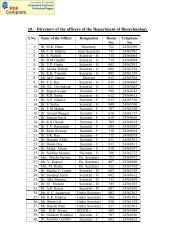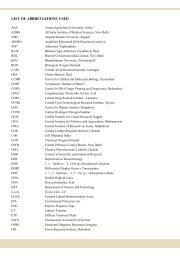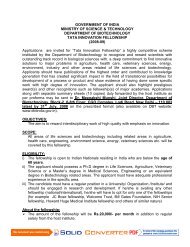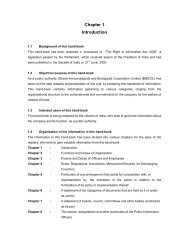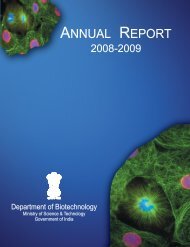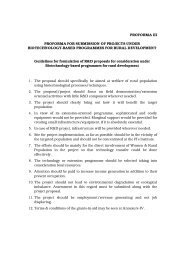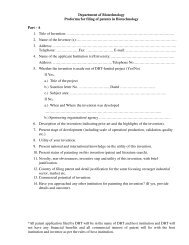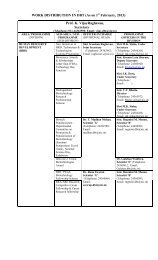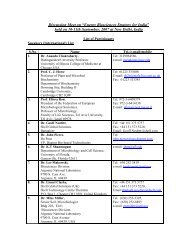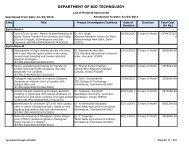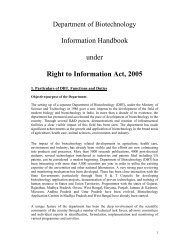ANNUAL REPORT - Department of Biotechnology
ANNUAL REPORT - Department of Biotechnology
ANNUAL REPORT - Department of Biotechnology
You also want an ePaper? Increase the reach of your titles
YUMPU automatically turns print PDFs into web optimized ePapers that Google loves.
Science or Food Science & Technology.<br />
Large Cardamom Product Plan<br />
Field evaluation <strong>of</strong> the performance <strong>of</strong> tissue cultureraised<br />
large cardamom vis-à-vis open pollinated<br />
seedlings continued on farmers' field in Uttarakhand<br />
state. About 34.45 ha area has been field planted<br />
during 2006 season using open-pollinated seedlings<br />
and tissue culture plantlets. Four training<br />
programmes for project personnel and farmers on<br />
cultivation and management <strong>of</strong> large cardamom<br />
have been organized.<br />
Microbial and Industrial <strong>Biotechnology</strong><br />
The technologies for production and application <strong>of</strong><br />
various enzymes having industrial importance such<br />
as keratinase, pullulanases, cellulase, laccase,<br />
protease etc. have been developed. Emphasis has<br />
also been given on production <strong>of</strong> enzymes like<br />
hydrolase, L-asparaginase, phytase, chitinase etc.<br />
and medicinally important fungal products such as<br />
fumagillin, lovosatin and ezetimibe. The new<br />
projects relevant to health sector are focused on<br />
development <strong>of</strong> a novel vesicular drug delivery<br />
system for psoriasis and biochip based diagnostics<br />
for detection <strong>of</strong> genetic diseases. Projects on hyper<br />
production <strong>of</strong> dyes/pigments from selected lower<br />
fungi for application in textile dyeing industry,<br />
development <strong>of</strong> membrane bioreactor for the<br />
synthesis <strong>of</strong> structured lipids, preparation <strong>of</strong> an<br />
amperometric biosensor for determination <strong>of</strong><br />
triglycerides, development <strong>of</strong> immunodiagnostic kit<br />
for the detection <strong>of</strong> Karnal bunt in wheat lots,<br />
production <strong>of</strong> wine from mango, and design and<br />
optimization <strong>of</strong> a circulating fluidized bed biomass<br />
gasifier have been implemented. Besides the<br />
identified thrust areas, proposals with<br />
novel/innovative ideas for product related discovery<br />
science and product development have been invited<br />
from prospective investigators through a Call for<br />
Proposals.<br />
<strong>Biotechnology</strong> Patent Facilitating Cell<br />
Patents are powerful tools, which can be used to<br />
assert supremacy in the present worldwide<br />
knowledge driven scenario. A patent is also one <strong>of</strong> the<br />
few assets that can increase in value over time. They<br />
motivate researchers who enjoy challenges; and<br />
they also help record and develop new ideas. The<br />
<strong>Department</strong> recognises this and facilitates patenting<br />
<strong>of</strong> research results from publicly funded<br />
programmes. The public also benefits as they receive<br />
new, useful ideas when the invention develops into a<br />
marketable product.<br />
Small Business Innovation Research Initiative<br />
(SBIRI) for Public Private Partnership<br />
The department has launched a scheme 'Small<br />
Business Innovation Research Initiative (SBIRI) in<br />
September, 2005 to bring biotech industry at the<br />
forefront <strong>of</strong> technological revolution. Under the<br />
scheme, innovative, risky R&D projects for<br />
establishing pro<strong>of</strong> <strong>of</strong> concept as well as development<br />
and commercialization <strong>of</strong> research leads having<br />
market demands are focused. The department has<br />
received tremendous response from the private<br />
sector. So far 34 projects are recommended in<br />
principle for support under the scheme.<br />
Biosafety issues<br />
Under Biosafety programme main emphasis is given<br />
to facilitate and implementation <strong>of</strong> biosafety<br />
procedures and guidelines for ensuring safety from<br />
the use <strong>of</strong> Genetically Modified Organisms (GMOs)<br />
and products there<strong>of</strong> in research and application to<br />
the users as well as to the environment in the<br />
institutions and industries where recombinant DNA<br />
work is being undertaken through Institutional<br />
Biosafety Committees (IBSCs), Monitoring-cum-<br />
Evaluation Committee (MEC) and Review<br />
Committee on Genetic Manipulation (RCGM) and<br />
other institutional structures. Apart from considering<br />
the applications submitted by various organizations<br />
involved in the recombinant DNA technology, RCGM<br />
has taken several policy decisions such as<br />
standardization <strong>of</strong> protocol for conduct <strong>of</strong> multilocation<br />
field trials, data collection parameters,<br />
nomenclature <strong>of</strong> transgenic crop/ gene/ event and<br />
new monitoring mechanism for Bt. cotton.<br />
Applications made by several applicants in pharma/<br />
agriculture sector for import <strong>of</strong> transgenic materials<br />
including transgenic seeds, conduct <strong>of</strong> pre-clinical<br />
11 An Overview



